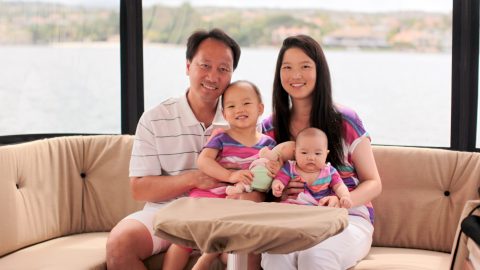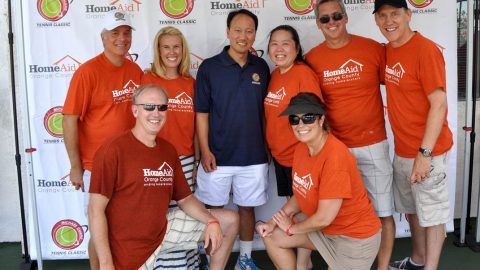When Jeremy Lin was a sophomore at Harvard, he was struggling emotionally. A good guard on an awful basketball team – the Crimson finished the season with an 8-22 record – he needed something more than hoops.
Lin, who had been baptized into an evangelical Chinese church near San Francisco in ninth grade and had come to value Christian fellowship through his youth group, was part of the Harvard-Radcliffe Asian American Christian Fellowship group, regularly attending Bible study.
But most of his life was spent with his basketball teammates and other athletes, he later told the Student Soul, a website of InterVarsity Christian Fellowship.
“It’s a tough environment and if you don’t have appropriate boundaries, you’ll compromise your faith,” he told the website, run by a major Christian college ministry, in 2010.
So, during his sophomore year, Lin stepped up his involvement in the Asian-American Christian group, about 80 members strong, gaining a sense of community that had eluded him.
CNN’s Belief Blog – all the faith angles to the day’s top stories
Those kinds of stories are becoming increasingly commonplace as more second generation Asian-Americans like Lin join campus Christian groups, said Carolyn Chen, who directs Asian-American Studies at Northwestern University.
“What’s happening at the college level, for students this is a really important time and this is a really important form of community,” Chen said. “It is also somewhat like an extended family for them.”
According to the latest census, the Asian population in the United States grew by 43.3% between 2000 and 2010, the largest percentage increase of any ethnic or racial group. Asians make up just under 5% of the population.
Asian-American Christianity, experts say, is growing along with that population boom, especially among second generation Chinese-Americans. Jeremy Lin, whose parents are from Taiwan and who talks openly about his Christian faith, has become a symbol of that trend.
Pyong Gap Min , a sociology professor at Queens College in New York, said there has been growth in the number of Asian-America Christian churches, though it is hard to get reliable numbers on the size of the community.
But Min said the number of Pan-Asian churches is increasing, especially on the West Coast, where congregations that have traditionally been dominated by one ethnicity have become multiethnic. Many of those churches are adding services specifically for second generation Asian-Americans, many of whom want services in English.
Chen said more Asian-Americans are also joining traditionally white evangelical congregations.
“You see Asians gaining more visibility in American evangelical circles,” Chen said. “What you are seeing is more integration.”
Lin grew up in Chinese churches. On college campuses, Asian Christian groups have grown up separately from the InterVarsity Christian Fellowship.
Jeremy Yang, a senior at Harvard who sits on the board of the Harvard-Radcliffe Asian American Christian Fellowship, said his group offers a place where faith and culture intersect. Students feel comfortable being with and sharing their faith with other Asian-Americans, he said.
The Harvard group began in 1994 as part of the Harvard-Radcliffe Christian Fellowship. So many Asians joined their Bible study that the founders decided to form a separate entity, he said.
“The growth was really explosive,” he said. “There is something about being Asian-American that attracted people into the fellowship.”
Fenggang Yang, author of “Chinese Christians in America: Conversion, Assimilation, and Adhesive Identities” and a professor at Purdue University, said Asians are drawn to Christianity partly by values that dovetail with Asian culture, including thrift, education and family.
“In that way it helps them assimilate into the U.S. culture while preserving important aspects of their cultures,” he wrote in an e-mail.
Evangelicals tend to have a value system that fits a widely held Asian desire for order and success, he writes in his book, adding via e-mail that Lin is being lifted up as an example of those values.
Despite being a superstar in high school, Lin received no scholarship offers to college. And despite being a high-scoring player by his senior year in college, he didn’t get drafted by the NBA.
Lin signed a free agent contract with the Golden State Warriors and seemed to get in the game only when his team was way ahead or far behind.
The Warriors sent him down to a developmental league, where he fought emotional battles while on long, late-night bus rides, he told an audience at River of Life Christian Church in Santa Clara, California, last year.
Lin, who until last month was sitting on his third bench in his short pro career, was given a chance to play when some fellow New York Knicks were injured. He responded with a record-setting stretch of games in which he scored more points in his first five starts than stars like Michael Jordan or Allen Iverson had over a similar number of games.
As a student, Lin led what the Harvard-Radcliffe Asian American Christian Fellowship calls a “family group,” a small group devoted to Bible study and praying for others.
“A lot of people looked up to him because he was good at sports and really solid in his faith,” said Yang, the Harvard senior.
Lin, who has said he may become a pastor someday, credits his rise as a professional athlete to understanding the way God was working in his life and developing a trust in God’s plan.
“I’ve surrendered that to God. I’m not in a battle with what everybody else thinks anymore,” he told the San Jose Mercury News last week.
But there have been plenty of struggles.
When he was sent down to the minor league the first time, Lin told a church group last year, he turned to his pastor, Stephen Chen, at the Church in Christ in Mountain View, California. Chen told him to spend an hour a day with God.
Lin memorized a few Bible verses, Chen says, including a passage from Paul’s letter to the Romans in the New Testament that reads in part: “We also glory in our sufferings, because we know that suffering produces perseverance; perseverance, character; and character, hope.”
READ MORE



